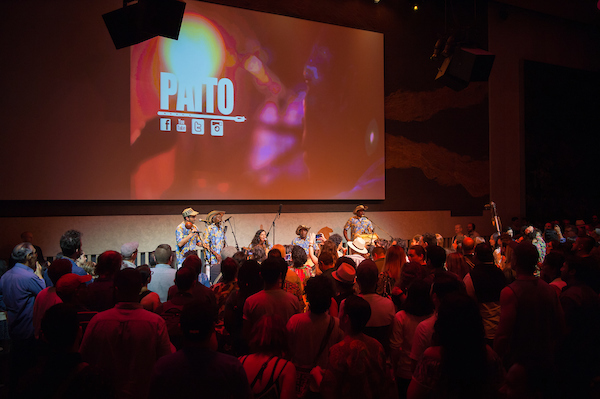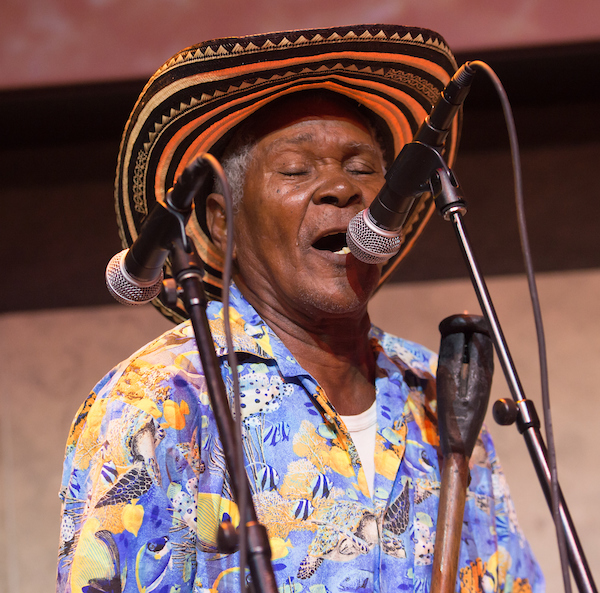All photos by Kevin Yaterola. Interview excerpts translated by the author.
On the evening of July 15, the David Rubenstein Atrium of Lincoln Center was filled to capacity, bursting with joyful residents of New York City ready to welcome, for the first time, the last surviving master of Afro-Colombian gaita negra music, Sixto Silgado, known as Paíto, and his group Los Gaiteros de Punta Brava. Paíto comes from the isolated Islas del Rosario, off the coast of Colombia near Cartagena. His work with the Bogotá-based label/management company Sonidos Enraizados has relaunched his career with new international touring opportunities for the elderly musician.
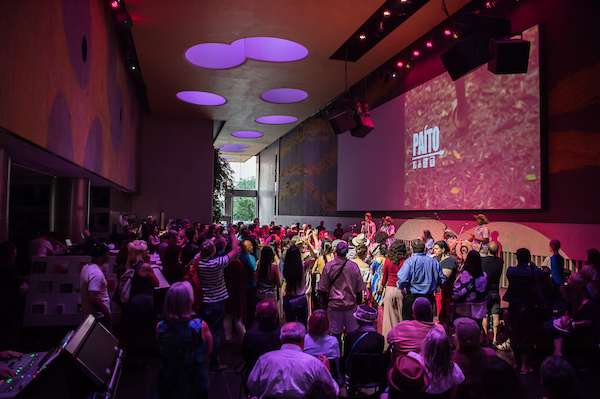 The atmosphere in the Atrium was tangibly charged with excitement even before the legend took the stage. As he walked through the crowd of adoring fans, many from the New York Colombian diaspora, they parted to let him pass as if watching a mirage. From Paíto's first ardent notes on his long wooden gaita flute, the group kicked in with a focused intensity.
The atmosphere in the Atrium was tangibly charged with excitement even before the legend took the stage. As he walked through the crowd of adoring fans, many from the New York Colombian diaspora, they parted to let him pass as if watching a mirage. From Paíto's first ardent notes on his long wooden gaita flute, the group kicked in with a focused intensity.
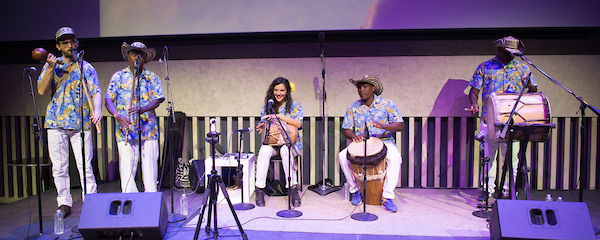 Paíto's son Diego played the lead tambor alegre drum, his son Joanis rocked the large tambora bass drum, and Lucía Ibáñez of Sonidos Enraizados held down the repetitive llamador drum (while cueing visuals on her laptop of Paíto in his home on Islas del Rosario); and last but not least, on Paíto's right hand side, Urián Sarmiento (cofounder of the label) played the supporting gaita macho while expertly twisting and shaking a maraca with his other hand.
Paíto's son Diego played the lead tambor alegre drum, his son Joanis rocked the large tambora bass drum, and Lucía Ibáñez of Sonidos Enraizados held down the repetitive llamador drum (while cueing visuals on her laptop of Paíto in his home on Islas del Rosario); and last but not least, on Paíto's right hand side, Urián Sarmiento (cofounder of the label) played the supporting gaita macho while expertly twisting and shaking a maraca with his other hand.
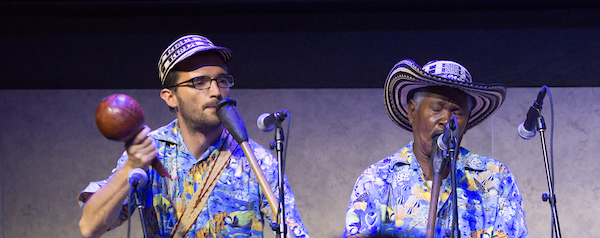 The two flutes wove together seamlessly, creating a hypnotic, repetitive but constantly shifting harmonic base for Paíto's improvisations. The booming bass drum and swishing of the maracas heightened the feeling of trance. The front of the stage quickly became a close-knit dance space, dancers twirling slowly around each other, radiant smiles breaking out everywhere. I recognized many New York-based Colombian musicians in the audience; they mostly stood still, watching Paíto with a mixture of adoration and genuine disbelief that he was really here, in front of our eyes, in the heat of a New York summer, at Lincoln Center.
Paíto is a diminutive elderly man with a quick smile that lights up his face when he speaks. When we sat down to talk before the concert, he told me, "My music is inherited. My father was a musician and my grandfather on my mother's side, my uncle, they were musicians as well. This is my inheritance, I carry this in my blood." Paíto began playing gaita at the early age of 13, learning from his father and other members of his family.
The two flutes wove together seamlessly, creating a hypnotic, repetitive but constantly shifting harmonic base for Paíto's improvisations. The booming bass drum and swishing of the maracas heightened the feeling of trance. The front of the stage quickly became a close-knit dance space, dancers twirling slowly around each other, radiant smiles breaking out everywhere. I recognized many New York-based Colombian musicians in the audience; they mostly stood still, watching Paíto with a mixture of adoration and genuine disbelief that he was really here, in front of our eyes, in the heat of a New York summer, at Lincoln Center.
Paíto is a diminutive elderly man with a quick smile that lights up his face when he speaks. When we sat down to talk before the concert, he told me, "My music is inherited. My father was a musician and my grandfather on my mother's side, my uncle, they were musicians as well. This is my inheritance, I carry this in my blood." Paíto began playing gaita at the early age of 13, learning from his father and other members of his family.
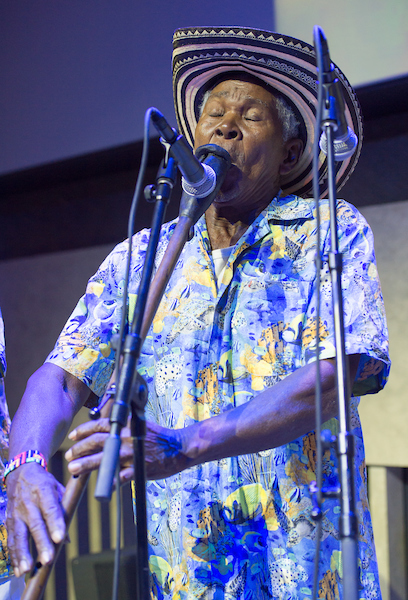 Morgan: There are many other people playing the gaita in Colombia, also in the diaspora. So, why do they call you el último gaitero, the last gaita player?
Morgan: There are many other people playing the gaita in Colombia, also in the diaspora. So, why do they call you el último gaitero, the last gaita player?
Paíto: Because I haven't stopped! Among my family, I'm the only one still living. My father died, the musicians on my mother's side died. There are many groups that play gaita, there are many people who are learning as well. There are people like myself who give classes in Bogotá as well. I've taught many gaita classes.
I used to play carrizo [a smaller cane flute] but when I left that behind, I went to the gaita. With the sound of gaita, I write compositions. I might play a cumbia, but with the gaita. The sound is different, it's my sound.
So, as someone who has maintained a style of traditional music, how do you see young people who play this music?
Well, now that there are young people playing gaita, but they can't do what I do on the gaita, not to the point I do it. Because I can play an accordion vallenato on the gaita, which is not an accordion, but rather a flute. I can play porro, brass-band music, on this wooden instrument. I can play any kind of music you might know, but others don't do that.
So, in your music, you mix different genres and styles as well.
Yes, but on the gaita. It's a different kind of mix. Many people ask me, "Paíto, how did you interpret that?" Me, I just know how to interpret any song on the gaita. Many people do not do that, not even here, they don't do it. They do what they can, but they don't reach to do what I do, because they're not in this.
Is there a musical message you have for the people of New York?
[Laughs] Well, this is the first time I've come to this city. But, when I get the chance to record, I can record a song, record a record in honor of this city! I have what it takes to do it!
We're looking forward to that record! Welcome to New York City! Of course! Thank you. Many thanks to Viviana Benitez and Meera Dugal at Lincoln Center for making this event and this interview come to fruition. And many thanks to Lucía and Urián of Sonidos Enraizados for bringing Paíto and his music to New York City.